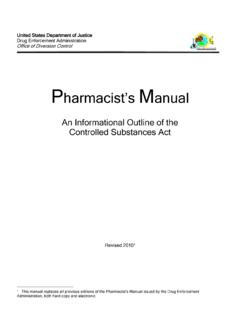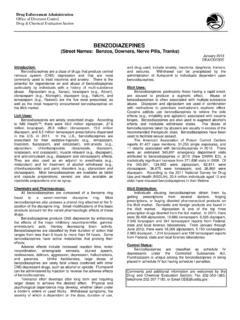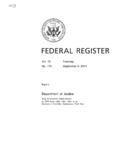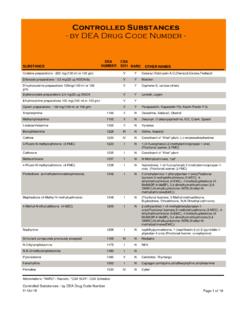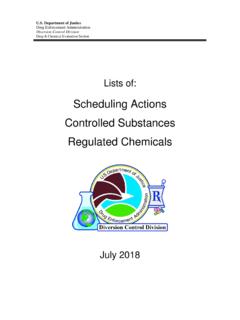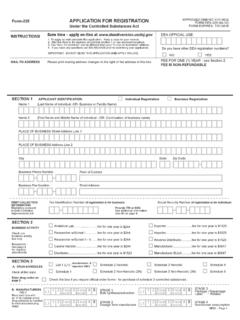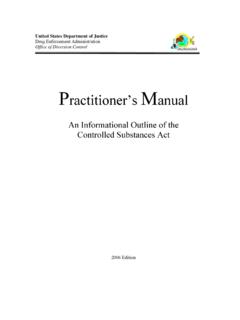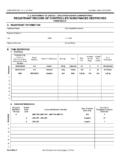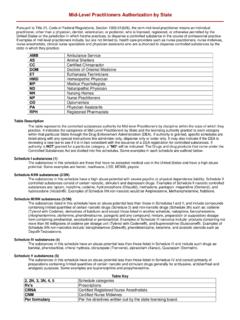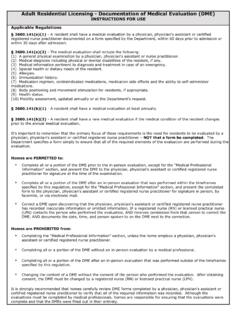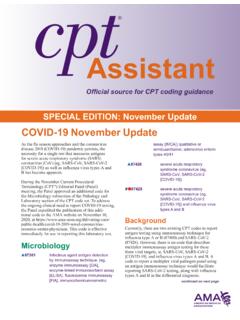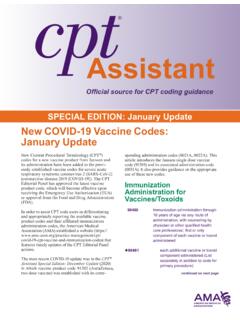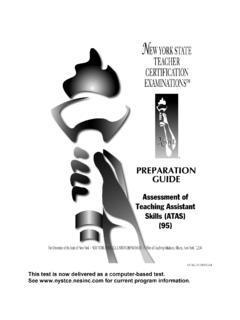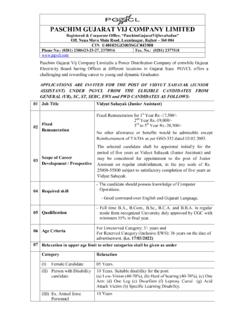Transcription of U. S. Department of Justice Drug Enforcement Administration
1 U. S. Department of Justice Drug Enforcement Administration DEA Registrants Dear Registrant: The Controlled Substances Act (CSA) provides that every person who dispenses, or who proposes to dispense, any controlled substance shall obtain from the Drug Enforcement Administration (DEA) a registration issued in accordance with DEA rules and regulations. See 21 822(a)(2). DEA may only register a person to dispense a controlled substance if that person is permitted to do so by the jurisdiction in which he or she practices. See id.
2 802(21), 823(f). Thus, unless subject to an applicable exception, DEA regulations require a practitioner to obtain a separate DEA registration in each state in which he or she dispenses a controlled substance. The DEA Administrator, however, is permitted by 21 CFR to grant an exception to the application of any provision in the DEA regulations codified in Chapter II of Title 21 of the CFR. This authority has been redelegated to the assistant Administrator of the Diversion Control Division. On January 31, 2020, the Secretary of Health and Human Services (HHS) declared a public health emergency with regard to Many states also have declared public emergencies and granted reciprocity to neighboring states and their practitioners with regard to medical licensing requirements.
3 As such, practitioners in such states are now permitted by state law to dispense controlled substances not only in their home states but also in states with which their home states have reciprocity. The requirement of a separate DEA registration in each state where the practitioner dispenses controlled substances is a core requirement essential to diversion control that would not normally be subject to an exception under 21 CFR However, in view of the extraordinary circumstances that have arisen during this public health emergency, and in order to ensure adequate medical care for the duration of this public health emergency.
4 DEA will grant an exception for practitioners in such states to those provisions of DEA regulations that normally require practitioners to register in each state where they dispense controlled substances. Under the exception being announced today, DEA- registered practitioners are not required to obtain additional registration(s) with DEA in the additional state(s) where the dispensing (including prescribing and administering) occurs, for the duration of the public health emergency declared on January 31, 2020, if authorized to dispense controlled substances by both the state in which a practitioner is registered with DEA and the state in which the dispensing occurs.
5 Practitioners, in other words, must be registered with DEA in at least one state and have permission under state law to practice using controlled substances in the state where the dispensing occurs. The practitioner must continue to comply with the laws and regulations of the state in which 1 For information regarding DEA s response to COVID-19, see 8701 Morrissette Drive Springfield, Virginia 22152 DEA Registrant Page 2 they are registered , and the laws and regulations of the state in which they are practicing, if different.
6 Thus, where one state s law and regulations are more restrictive than the other state s law and regulations, the practitioner generally must follow the more restrictive law and regulations. That said, a practitioner may be operating under a state reciprocity agreement or other form of state permission that authorizes the practitioner to comply only with the normally applicable law or regulations of either the state in which they are registered or the state in which they are practicing. In other words, states may deem compliance with one state s normally applicable law and regulations as compliance with both states laws and regulations.
7 Under this circumstance, DEA would understand the practitioner to be complying with both states laws and regulations because the practitioner s actions would be authorized by both states. The exception granted in this letter also applies to the prescription of controlled substances via telemedicine to patients in states in which a practitioner is not DEA- registered . Under the CSA, a prescription for a controlled substance issued by means of the Internet must generally be predicated on an in-person medical evaluation. See 21 829(e)(1). This requirement does not apply, however, when a practitioner is practicing telemedicine as defined by the CSA.
8 The CSA s definition of the practice of telemedicine includes multiple different categories of telemedicine. For several of these categories, the CSA specifically requires a practitioner to have a DEA registration in the state in which the patient is located. See, , id. 802(54)(A), (B). But the practice of telemedicine during a public health emergency pursuant to 21 802(54)(D) does not include this requirement. On March 16, 2020, the Secretary of HHS, with concurrence of the Acting DEA Administrator, designated that the telemedicine allowance under section 802(54)(D) applies to all schedule II-V controlled substances in all areas of the United States.
9 Thus, in light of this designation and subject the conditions of this letter s temporary exception, DEA- registered practitioners may prescribe controlled substances to patients in states in which they are not registered with DEA via telemedicine. This exception is granted from March 23, 2020, through the duration of this public health emergency as declared by the Secretary of HHS. Practitioners are not required to apply for this exception from DEA regulations individually; rather, by this announcement, DEA has granted this exception to all DEA- registered practitioners who satisfy its conditions.
10 We hope this information is helpful. For information regarding DEA s Diversion Control Division please visit Please contact the Diversion Control Division, Policy Section at (571) 362-3260 if you seek a dditional assistance regarding this or any other matter. Sincerely, William T. McDermott assistant Administrator, Diversion Control Division. DEA067 March 25, 2020
